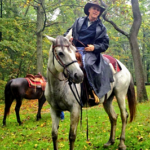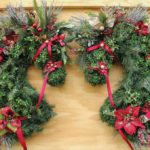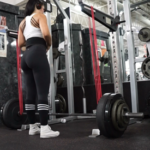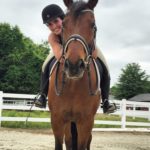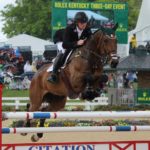 Brian, Sally and David O’Connor water their horses on their cross-country trek in 1973. | Courtesy O’Connor Equestrian, Inc.
Brian, Sally and David O’Connor water their horses on their cross-country trek in 1973. | Courtesy O’Connor Equestrian, Inc.Eleven-year-old David O’Connor, his older brother, Brian, and his mother, Sally, decided to ride across the country in an equine emulation of Kon Tiki, a book that had fascinated Brian. It was a journey that none of them would ever forget, and it influenced their lives forever.
Planning for the expedition, they hoped to reach “oasis” stables (the places where they knew someone) every 10 days or so, in order to be able to rest. But their ambitious goal of riding an average of 30 or 25 miles a day didn’t always pan out. Although on one amazing day, they went 48 miles, on other days, they only made it into the teens. Still, it was an incredible undertaking for these modern day Lewis and Clarks, who–like the early explorers–persevered through their own kinds of hardships. Let David tell you all about it:
I was riding a horse called Ralph. He was loaned to us by Ray Little, a Maryland horse and trailer dealer whose wife, Lynne, and daughter, Marilyn, now are grand prix show jumping stars.
Brian was on B.G., a neighbor’s horse, and Mom was aboard her event horse, Gung Ho. We had a few days of trial runs, getting the horses used to packing our gear by riding around the neighborhood. I remember a bucking bronco session when Ralph decided he didn’t like being a pack horse. You realize you haven’t packed well when everything falls in a rain of stuff from the saddlebags.
Unlike the pioneers whose path we followed to some extent, we rode in English saddles, with sleeping bags tied behind them. Basically all we carried was a change of clothing, rain ponchos that could double as tents, ropes, a set of farrier’s tools, food and a harmonica we didn’t know how to play. Across my lap I balanced a nylon duffle bag full of oats. Because I was the lightest, I had to carry the most weight.
We set out on May 13, 1973, which appropriately was Mother’s Day, beginning from White’s Ferry in Maryland on the towpath of the C&O Canal. The canal, a project started by George Washington, goes straight west, which is where we were headed. Friends came down to see us off, as did several newspaper reporters and photographers. And then we started riding. At the end of that momentous first day, after we completed our 30 miles, friends came down to meet us and brought along food, which we ate both ravenously and gratefully.
I remember one of my mother’s pals saying, “This is the way you should do the whole thing. You should have it catered.”
I’ll never forget that night, because I was sore. I’d been rubbed raw from new jeans we hadn’t washed before we set off. Boy, was that a big mistake and far from the only one we were to make on our journey.
Once the horses finished eating from nosebags, we turned them out in an 8-acre field. That was learning experience number two. Even though they had all night to eat and relax, they apparently were reluctant to head down the trail again. It took us three frustrating hours to catch them.
 Young David O’Connor prepares for his cross-country trip. | Courtesy O’Connor Equestrian, Inc.
Young David O’Connor prepares for his cross-country trip. | Courtesy O’Connor Equestrian, Inc.So the next night we tied them to a tree. That did not turn out to be the best solution to the problem, because in the morning we found they had wound their ropes all around the trunk so they were stuck tighter than ticks. We didn’t know how to tie them, having not yet learned the wisdom of the old maxim, “Tie horses high and dogs low.”
But those mishaps were nothing compared to other situations we were to face. Real trouble found us early on. One of the stone aqueducts across the river was only 6 feet wide, and there was no way to get around it. Since the alternative was back-tracking 70 miles, we wound up getting off the horses and gingerly walking them across the narrow top, making sure we didn’t look down.
Those hair-raising moments atop the aqueduct really impressed on us that this trip was going to be a challenge, not a lark. And yes, we found ourselves doing a lot of problem-solving along the way.
But there were also unexpected bonuses. After the tow path we were in West Virginia on the edge of Route 50. By 4 or 5 o’clock in the afternoon each day, we’d start knocking on doors of farmhouses, looking for a place to stay. We’d tell people what we were doing, and when they recovered from their surprise, they’d invite us to spend the night. We usually asked to sleep in the barn, but they’d often insist we sleep in the house, in real beds that were quite a treat for us after days of curling up in sleeping bags.
These stops were an opportunity for me to relax a little bit, and I was always hopping up on a tractor or playing with the other kids who we met along the way. In the course of our door-knocking, we only got turned down three times. You know, the fact that we were a mother and her two kids on their own meant people were very protective of us. And most of them couldn’t believe what we were doing.
“You’re from where?” they’d ask incredulously. “And you’re going where?”
When we weren’t lucky enough to find a hospitable farmhouse, we’d sleep along the road at a rest stop, lying down as best we could on picnic tables. One night, some people drag-racing at 3 or 4 in the morning scared the horses, and we worried about them trying to high-tail it home. On another evening, the horses got loose in a thunderstorm and were racing around like mad before we managed to round them up, all of us a lot soggier for the experience.
So Meredith Manor was a welcome pit stop when we finally reached it. We met a bunch of college kids there, which was fun, and it was nice to sleep in a real bed again and have stalls for the horses. We also took this opportunity to get the horses shod. Because we’d been traveling on paved roads a great deal of the time, their shoes were so thin you could bend them in half.
From West Virginia, we went into Ohio, where it rained every afternoon as we trotted uncomfortably past the pig farms and soybean fields. In Chillicothe, we rode into a drive-in and ordered as if we were in a car. When the waitress came out with our meal, she went into shock and nearly dropped the food. Actually, I’m surprised she didn’t see more people on horses, since it was the summer of the gasoline embargo and endless lines at filling stations. Some of the people who drove by us probably were envious that our transportation ran on oats.
Our trip was a low-budget operation. We rode into a lot of towns without money in our pockets, but people always took care of us. As we went on things got better, because our trip received publicity and folks knew we were coming so they’d look out for us.
In Nebraska, where we were on one road the whole way, the police came out one night to deliver a message that some people had invited us to stay with them. Their place was a little off the highway, and by the time we were heading there it was dark. We exited from the highway on a narrow, two-lane bridge.
For some reason, I was in front for a change, and this truck came rolling off the highway. He didn’t see me until it was too late and he was so close, he never had a chance to slow down. The truck went rolling by me at 70 mph. The horses, however, didn’t miss a beat. That was lucky since there was a 400-foot drop into a gully from the ramp, and if they had spooked, it would have been all over. I will never forget seeing the rivets on that tractor-trailer as it went by; that’s how close he was.
That was probably our most dangerous moment, but there were other times of great uncertainty, like getting lost in the Rocky Mountains, where we wound up staying with sheep herders. We kept in contact with Dad by calling collect to tell him where we were. He had a map of the U.S. in his office, and using thumbtacks, he followed our progress by marking all the places we’d been.
This trip was life-altering, for so many obvious reasons. But the biggest thing it did for me, from a character point of view, was give me a tremendous amount of respect for how people live. We stayed both with very poor people and very wealthy people. No matter where I go in the world, I get along with folks because I have so much respect for what they do. I don’t believe that one job is lower than another job, that’s just not in my makeup, and a lot of that mindset is from the trip.
I have a job that has a very high profile, but there are people with other jobs who are as serious about the things they do–whatever they are–as I am about what I do. The difference between what many people do and what I do is that I picked a very public format, and when you make a mistake, everybody talks about it for a long time.
David O’Connor won individual eventing gold at the 2000 Olympics and shared the team bronze with his wife, Karen. To read the rest of what happened on the O’Connors’ cross-country odyssey, along with many other stories, order Life in the Galloping Lane.



